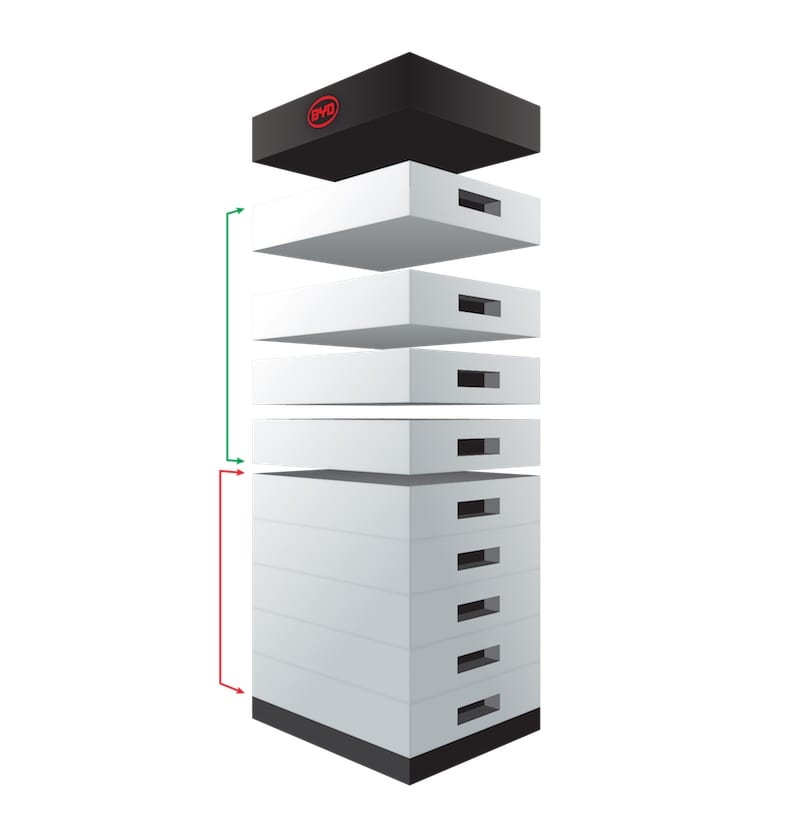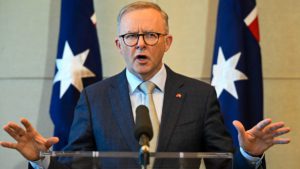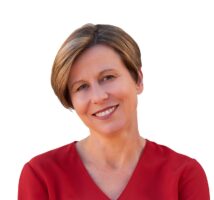 China’s biggest electric vehicle and battery maker, BYD, is ramping up efforts to seize a 25 per cent share of Australia’s battery storage market, after locking in an impressive 8-10 per cent share in its first year selling batteries to Australian homes and businesses.
China’s biggest electric vehicle and battery maker, BYD, is ramping up efforts to seize a 25 per cent share of Australia’s battery storage market, after locking in an impressive 8-10 per cent share in its first year selling batteries to Australian homes and businesses.
In a launch at Sydney’s Museum of Contemporary Art on Wednesday night, the manufacturing giant again laid down its vision for the Australian battery market, as it rolls out a broader range of flexible, modular residential focused products and ramps up competition with industry rivals Tesla and LG Chem.
As well as being a market pioneer in China, the company, whose name is an acronym for Build Your Dreams, has had considerable success with its battery storage products in European markets, and particularly in Germany.
But it shifted its focus to Australia in February last year, as a key emerging market for its B-Box range of modular, lithium-ion batteries.
One year later, the company has unveiled a slightly updated range of modular “solar batteries” for the Australian market, which it says have higher usable energy and high discharge power.
The battery modules start at 3.5kWh (up form 2.5kWh), and can be stacked up to 14kWh. Beyond that – for bigger residential and smaller commercial projects – the 14kWh battery stacks, or boxes, can then be “daisy chained” together in groups of three to get 42kWh.
At the bigger end of the commercial scale market, battery packs from the “same family” can provide capacity up to 300kWh.
Once again, BYD is not saying much about prices – and we will keep you posted of any updates on the pricing for the new range – except to stress the company’s industry leading level of vertical integration as a major advantage on this front.
“The major benefit we have is that we control the supply chain, all the way from the lithium mine,” said BYD director of global sales, Julia Chen, speaking with One Step on Tuesday.
“Our (stationary) battery storage business can benefit from the huge platform provided by our electric vehicle manufacturing – both on technology, and cost,” she said.
To put that in some perspective, while Tesla extracts itself from “production hell” in its barely finished gigafactories to actually begin meeting the huge amount of demand for its batteries and cars, BYD sold more than 108,000 plug-in EVs in China in 2017 – and that was a slow year. On average, says Chen, it releases seven new EV models very year in China.
In terms of stationary energy storage manufacturing volumes, however, it has only recently overtaken Tesla.
But while BYD sees Tesla as a major rival, Chen says building up the Australian market for battery storage has been an industry-wide effort.
“We consider that Tesla is also a pioneer in batteries,” Chen told One Step, in an interview on Tuesday. “They have done a great job bring attention to the industry and in educating consumers about the technology,” she said.
And BYD is also looking to target a slightly different part of the battery storage market with its product that Tesla, whose Powerwall 2 starts at 13kWh.
With its smaller batteries, BYD hopes to corner that market of rooftop solar homes that are unsure of committing to battery storage, or put off by the cost, and want to start small, with 3.5kWh, or even the 2.5kWh modules the company released here last year.
The benefit in this case is that households can then continue to add more capacity, as the costs go down and as they get a better idea of how to make the best use of solar and storage.
And as SunWiz’s Warwick Johnston pointed out here, for many Australian households, installing a smaller battery bank is probably a better investment than a larger one – at least until costs fall a bit further.
“We think of Australia as really one of the world’s leading emerging markets,” said Chen, citing its abundant sunshine and well developed solar industry as the key drivers of this.
“And we see strong interest in battery storage.”
This article was originally published on RenewEconomy’s sister site, One Step Off The Grid, which focuses on customer experience with distributed generation. To sign up to One Step’s free weekly newsletter, please click here.









